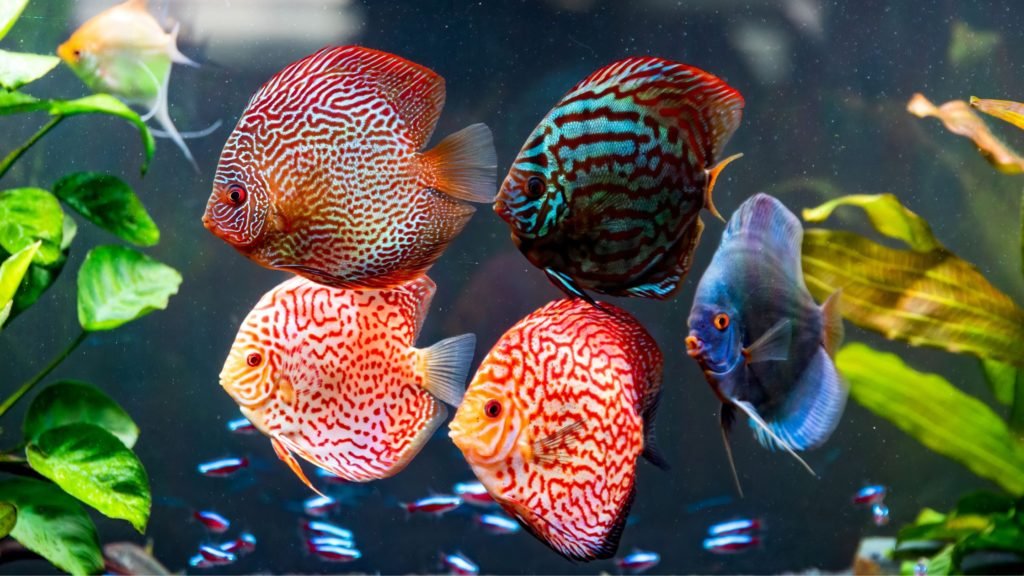Shatter myths with our deep dive into Fish Intelligence. You’ll be amazed at how these creatures remember, learn, and socialize. If you’ve ever wondered about the mind of your fish swimming serenely in your aquarium, then you’re about to embark on an eye-opening exploration. Many questions the concept of fish intelligence, assuming these aquatic creatures have little cognitive abilities. However, recent studies suggest otherwise, opening up a fascinating world beneath the surface. Intrigued? Let’s dive into the depths of fish intelligence.
Fish Cognition: A Deep Dive
Fish cognition is a topic that has garnered significant attention in recent years. Scientific studies reveal that fish exhibit intriguing cognitive abilities contrary to long-held beliefs. They can perform complex tasks, showcasing behavior that indicates problem-solving skills, social interaction, and even long-term memory.
Do Fish Have Intelligence?
The question “Do fish have intelligence?” used to be met with skepticism. However, contemporary research suggests that fish can learn, adapt, and demonstrate behaviors that hint at intelligence comparable to some terrestrial animals.
Fish Memory: More than Three seconds
The question “Do fish have intelligence?” used to be met with skepticism. However, contemporary research suggests that fish can learn, adapt, and demonstrate behaviors that hint at intelligence comparable to some terrestrial animals.
Fish Learning Behavior: A Fascinating Display
Fish learning behavior is an exciting area of study. Researchers have discovered that fish can learn to recognize other fish, respond to visual signals, and even navigate mazes. This learning ability extends beyond individual experiences, as fish often learn from observing other fish, displaying social learning behavior.
How Smart Are Fish?
How bright are fish? The answer may surprise you. Fish are adept at recognizing patterns, displaying social hierarchy, and navigating their complex aquatic environments. Studies have even shown that some fish can count, showcasing numerical understanding
Intelligence of Different Fish Species
Not all fish are created equal, especially when it comes to intelligence. Some species exhibit remarkable cognitive abilities, surprising scientists and hobbyists alike.
Goldfish
Goldfish, for instance, have been trained to push levers for food, associating specific colors or symbols with rewards.
Bettas
Bettas, or Siamese Fighting Fish, are known for their aggressive nature but also demonstrate impressive learning capabilities. They can recognize their caregivers and even perform tricks!
Manta Rays
Moving to the larger spectrum, Manta Rays, a fish species, have a brain-to-body ratio similar to that of birds and mammals, suggesting high cognitive abilities.
Fish Problem-Solving Abilities: Demonstrating Ingenuity
Fish problem-solving abilities often take center stage in discussions around fish intelligence. Scientists have observed fish using rocks to crack open shells and adapting their behavior to overcome obstacles, indicating their ability for creative problem-solving.
Fish Social Behavior: A Community Underwater
Observing fish’s social behavior reveals much about their intelligence. Fish use intricate methods of communication and often operate in structured social groups. They demonstrate cooperative behaviors, territorial disputes, and social hierarchies, all suggesting intelligence beyond basic survival instincts.
Fish Recognition Skills: Familiar Faces in the Deep
Fish recognition skills have fascinated scientists and fish enthusiasts alike. Many fish species can recognize other fish and humans, remember them, and adjust their behavior based on past experiences. This ability is yet another testament to the profound intelligence of these underwater creatures.
Fish Communication Abilities: More Than Just Bubbles
Fish’s communication abilities are complex and varied. From electrical signals to body language and even sound, fish use a multitude of ways to communicate with each other. It goes beyond simple alerts for danger – fish speak for social bonding, territorial disputes, and mating rituals. These complex methods of communication further substantiate the argument for fish intelligence.
Studies on Fish Intelligence: What Scientists Have Uncovered
Scientific studies on fish intelligence have provided insightful revelations. Research has demonstrated that fish can associate symbols with food, remember the layout of their environment, learn from observation, and even show self-awareness to some degree. This kind of learning and memory capability was once thought exclusive to higher mammals, making these discoveries significant.
Pioneering Research
One pioneering researcher in the field of fish intelligence is Dr. Culum Brown. His studies have shed light on many aspects of fish cognition, proving that fish are sentient beings with long-term memories, social structures, and problem-solving skills.
Comparing Fish Intelligence with Other Animals
When comparing fish intelligence with other animals, it’s essential to appreciate the unique context of their aquatic environment. Fish face different challenges compared to terrestrial animals, which have shaped their cognitive abilities. For instance, their spatial memory and navigation skills often surpass those of many land animals as they maneuver in a three-dimensional environment.
Fish and Birds: A Comparative Study
Some species of fish have even demonstrated problem-solving skills comparable to those of birds. Archerfish, for example, are known for their unique hunting strategy of shooting water jets to knock insects into the water. That requires precise aim, calculation, and the ability to adjust for light refraction – a degree of complexity often associated with birds and mammals, not fish.
Fish Training Techniques: Enhancing Your Pet's Skills
Like you can train a dog, fish training techniques have emerged that allow hobbyists to engage with their pet fish on a new level. Through reward-based training, fish can be trained to do tricks, navigate mazes, and play soccer. This type of training enriches their environment and provides an interactive and engaging experience for their owner.
The Fish School
A notable example is the Fish School, a company that has developed training kits to teach fish various tricks. The successful training of fish using these kits is a testament to fish’s cognitive abilities.
Now that you know more about fish intelligence, it’s clear that these creatures are much more than just simple beings. They possess a level of cognition and social complexity that rivals, and in some aspects exceeds, that of many land animals. Indeed, fish are more intelligent than they are given credit for, and there’s much more to learn about these fascinating creatures.
Final Thoughts
In conclusion, fish intelligence is a field that has much to offer in our understanding of animal cognition. With their impressive memory, problem-solving skills, and learning ability, fish have demonstrated that they are far more intelligent than traditionally believed. As we continue to explore this fascinating area of study, it’s clear that we will continue to be surprised and impressed by the mental capabilities of these amazing creatures.
FAQ
Q1: How smart can fish get?
While it varies by species, some fish have exhibited impressive cognitive abilities, such as problem-solving, learning from experience, and long-term memory.
Q2: Can fish recognize their owners?
Some studies suggest that certain fish species can recognize human faces, which might extend to identifying their owners, significantly if the owner is associated with feeding time.
Q3: Are there any specific fish species known for their intelligence?
Certain species, like the betta fish, goldfish, and cichlids, are known for their higher intelligence levels.
Q4: Can I train my pet fish at home?
With patience and consistent reward-based training, you can teach your fish to perform tricks, like swimming through a hoop or navigating mazes.
Q5: Can studying fish intelligence benefit humans?
Studying fish intelligence can provide insights into animal cognition and behavior, which can be helpful in numerous fields, including neuroscience, environmental science, and animal behavior.
Related Articles

Mastering the Art of Dog Training: How to Train Your Dog to Stop Barking
Introduction to Dog Barking Barking is

How to Clean Goldendoodle Ears: Preventing Infections
Welcome to our essential guide on

Top Picks: Best Harness for Goldendoodle Revealed!
Welcome to our comprehensive guide on

Insider Tips for the Perfect Goldendoodle Diet
Struggling with your Goldendoodle’s diet can

Goldendoodles Grooming: The Ultimate Toolkit for Perfect Care
Table of Contents Welcome to the

Discover the Perfect Dog Nail Grinder for Your Furry Friend
Finding the ideal dog nail grinder can be

